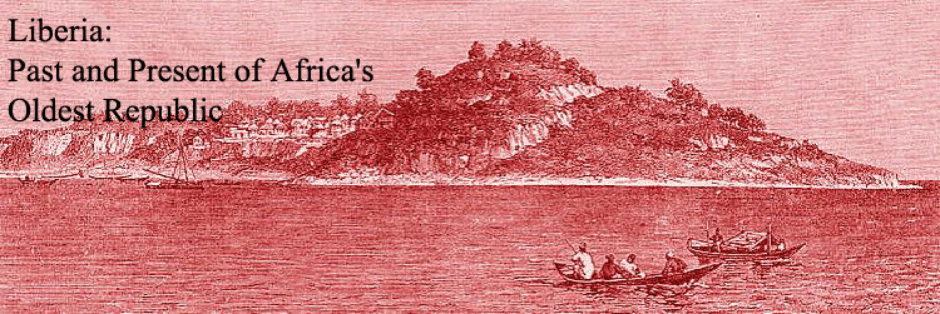Last week it was announced in Monrovia that the infamous former Liberian warlord Prince Johnson is to run for President. Nineteen years ago Prince Yormie Johnson captured then President Samuel Doe, ordered his men to torture, mutilate and execute him, while all gruesome details were videotaped. The tape, showing Johnson watching the spectacle while drinking a Budweiser beer, later found its way all over West Africa, was shown on TV all over the world and can still be seen on YouTube.
On September 22, James Fromoyan, the head of the independent Liberian National Electoral Committee (NEC), said that Johnson’s recently created political party, the National Union for Democratic Progress (NUDP), met the constitutional requirements to compete in next year’s presidential elections. Insignificant as this news may have been, it immediately made it to the major news sites (AP, AFP, BBC, VOA, etc, but not only foreign, also Liberian). Good news travels fast, but bad news sometimes even travels faster.
All news sites mentioned Johnson’s responsibility for Doe’s death, some also referred to the final report of the Liberian Truth and Reconciliation Committee, which left no doubt as to the criminal record of Prince Johnson – now an elected senator for Nimba County. None of these news sites, however, mentioned Johnson’s claim that he murdered President Thomas Sankara of Burkina Faso in October 1987. Although all circumstances surrounding Sankara’s death are still (2010!) not yet known, there are very strong indications pointing to the involvement of warlord-turned-president Charles Taylor, Prince Johnson, and Blaise Compaoré, once Sankara’s best friend, and since October 1987 President of Burkina Faso.
Like Prince Johnson, Charles Taylor, and numerous other Liberian warlords, Blaise Compaoré has blood on his hands. Yet he has been President of this poor Sahel country for almost 23 years (1987 – present). Compaoré is far from the only African president enjoying impunity for his crimes. He is in the company of a large number of other African presidents, ranging from small-size countries such as The Gambia, Equatorial Guinea and Rwanda, to medium-sized countries such as Chad, Uganda and Zimbabwe, and big countries such as Ethiopa and Sudan – to name but the most obvious ones.
The Gambian President, officially: His Excellency President Sheikh Professor Alhaji Dr. Yahya Abdul-Azziz Jemus Junkung Diliu Jammeh, seized power in a bloodless military coup in 1994 but is being held responsible for a number of human rights abuses in the small West African country which is completely surrounded by Senegal. Equatorial Guinea’s Teodoro Obiang Nguema Mbasogo is in power since 1979 (!) after chasing his uncle, dictator Macias Nguema, who was executed shortly after the military coup. The fabulous oil revenues of this small country only benefit a small group of people close to the President.
Paul Kagamé led an invasion into Rwanda where he emerged as the military strongman after the 1994 genocide. He rules the country with an iron fist. In Chad, Idriss Deby was at first welcomed as a liberator after Chadian President Hissein Habré fled to Senegal in 1990 – with millions of stolen funds – but has since disappointed many. He manages to stay in power, using the country’s oil revenues, and has just celebrated his 20 years in power. Ugandan President Yoweri Museveni also came to power through the barrel of a gun – in 1985 – chasing his predecessor with a ‘liberation army’. He was one of the first ‘liberators’ in Africa to use child soldiers to fight his opponents and was / is internationally admired for bringing stability to the ‘Pearl of Africa’. Zimbabwe’s President Robert Mugabe (1980 – present) may not need any comments. Supported as a freedom fighter against the white minority regime of Ian Smith (1965 – 1980) he is a shame for Africa and the world. The atrocities in Matabeleland are even small crimes compared to the devastation of the economy of what was once one of Africa’s most promising countries at independence.
In East Africa, the peoples living in two big countries, Ethiopia and Sudan, are not luckier with their governments. Meles Zenawi, headed a ‘liberation army’ like many of his colleagues, and in 1992 chased the Red Emperor of Ethiopia, Miriam Mengistu, who has since lived in exile in Zimbabwe. Like Hissein Habré of Chad, Mengistu is internationally wanted, but has managed to escape from justice. Meles Zenawi, now officially Prime minister, after being President for many years, is the real ruler of Ethiopia. Does anybody know the name of the present President of Ethiopia?! Like all other African presidents mentioned here who came to power by military means – without distinction – Meles Zenawi was elected and re-elected, but increasingly used force, undemocratic means and human rights abuses to achieve his goals. Last but not least, President Omar al-Bashr of Sudan. He came to power trough a military coup in 1985 and is now wanted for war crimes and crimes against humanity.
The foregoing overview focuses on sitting presidents and leaves aside former presidents who since have disappeared following multi-party elections, another coup d’état or civil war, or because of a natural death (apart from Habré and Mengistu). The most notorious of them are Abacha (Nigeria), Doe (Liberia) and Mobutu (Zaïre/DRC).
Conclusion
I do realize that Sub-Sahara Africa counts nearly 50 independent countries – 48 to be precise, or 47 when we exclude Somalia (and ignore the existence of Somaliland and Puntland). I have excluded from the foregoing countries where more or less recently military coups took place: Central African Republic, Guinea Bissau, Guinea Conakry, Mauritania, Niger, not to speak of countries with ‘civil unrest’ or with an unresolved civil war like Ivory Coast – not to speak of Sierra Leone or Liberia…
What has the foregoing to do with Liberia or Prince Johnson?
The answer consists of two words: ‘Impunity’ and ‘Democracy’.
Do I need to say more?
